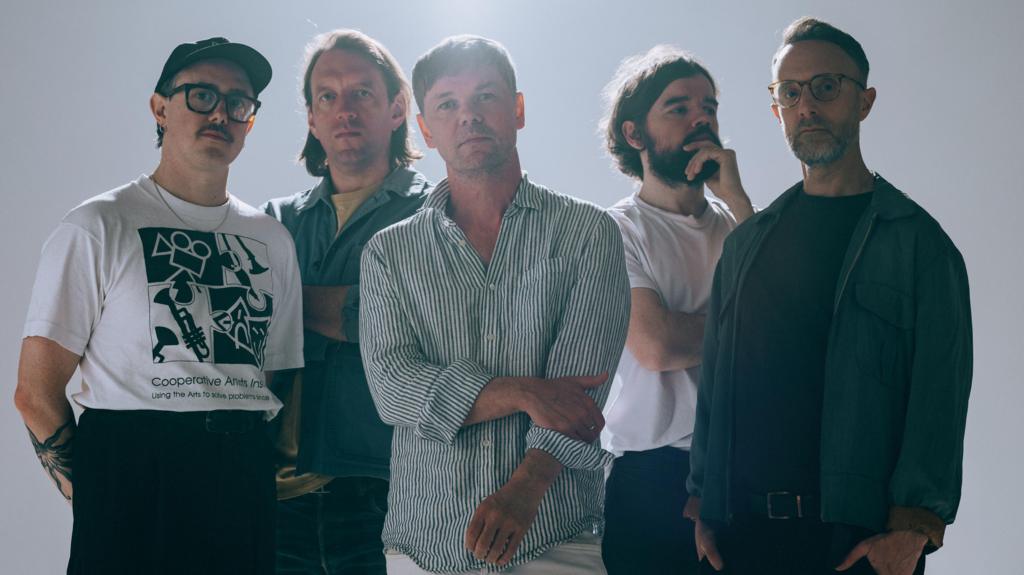“`html
Idlewild honed their craft in the intimate settings of Scotland’s pubs and clubs. Now, these indie rock mainstays advocate for the preservation of such venues for future generations.
Numerous venues have been compelled to close their doors in recent years, with the financial repercussions of the 2020 Covid shutdown proving insurmountable for some.
“These venues evolve into community hubs for music enthusiasts. They warrant the same safeguarding as libraries, given their cultural significance,” asserts guitarist Rod Jones.
Formed by students in Edinburgh in 1995, the group has ascended to become one of Scotland’s most esteemed bands, with their tenth studio album released on Friday.
In a video call with the BBC, both Rod and vocalist Roddy Woomble expressed their belief that the record, their first in six years, aptly encapsulates their three-decade career.
However, such longevity would not have been possible without the availability of performance spaces in their early years. Finding such venues proved more challenging in Edinburgh than in Glasgow, where the band frequently performed at iconic establishments like Nice N’ Sleazy.
“A thriving music scene requires a nucleus where individuals can learn and develop,” Roddy states.
“Glasgow has consistently offered more of that than Edinburgh, which made it difficult for us to establish ourselves initially.”
“We ultimately resorted to playing in a pub to improve our skills, but how can aspiring musicians learn without access to gigs like that?”
Three decades later, it is difficult to find a venue that Idlewild has not graced with their presence.
This might come as a surprise to those who witnessed the band’s early performances, characterized by a cacophonous energy, famously and vividly described by the NME as “the sound of a flight of stairs falling down a flight of stairs.”
However, a more introspective and melodic sound emerged, with the 2002 release of The Remote Part establishing Idlewild as a purveyor of poetic lyricism as well as raw energy.
In recent years, the band – consistently featuring Roddy, Rod, and drummer Colin Newton despite line-up changes – revisited The Remote Part for a series of performances in its entirety.
This decision ultimately inspired their future direction while simultaneously celebrating their past achievements.
“Those 20th-anniversary concerts of The Remote Part helped us recalibrate and refocus on our future goals,” Roddy explains.
“Anniversary shows often feel like an overemphasis on the past, which I tend to dislike until I’m actually involved in them.”
“I generally prefer to concentrate on the present. However, these gigs turned out to be absolutely brilliant because of the shared excitement surrounding a beloved album.”
The year 2025 has seen a surge in nostalgia, exemplified by the Oasis reunion tour.
Idlewild was never aligned with the Britpop movement spearheaded by the Gallagher brothers, drawing inspiration instead from American alternative rock.
Nevertheless, both Roddy and Rod have observed the reunion and the outpouring of emotion from fans of all ages with interest.
“These concerts represent cultural events, and I find them truly fascinating, particularly as someone who lived through that era,” Roddy explains.
“In the 1990s, we regarded the 1960s as a pivotal cultural touchstone, and now the 1990s are being celebrated in a similar way.”
“They’ve attracted a new generation of fans, and the atmosphere feels distinct; it’s not just older fans drunkenly singing along to Roll With It, but also new devotees.”
“It’s powerful to witness these generations united by the music. While we may not have reached the scale of Oasis, we have provided the soundtrack to some people’s lives, and we now have two generations of fans.”
The band’s new release indicates a promising future, with Roddy and Rod both agreeing that the album incorporates elements from across their career.
The result is a fitting representation of the group, from the towering rock of opening track Stay Out of Place to the spirited pop of Like I Had Before and the sharp indie of Writers of the Present Time.
“I believe we have created the best version of ourselves, in an authentic way,” says Rod, who also produced the record.
“It didn’t unfold as we initially anticipated, taking unexpected turns, and we pushed the boundaries of what the band is capable of at times.”
“We’ve certainly overcomplicated things in the past, which often worked to our advantage, but my priority this time was to maintain a clear focus.”
The band will soon embark on a series of tour dates across the UK, culminating in December shows in Aberdeen, Dundee, and Glasgow.
Touring presents a greater challenge for the band now, given their family responsibilities and geographical separation, with Rod residing in Edinburgh and Roddy living on the picturesque Isle of Iona.
However, Roddy emphasizes that live shows are always a welcome experience, regardless of whether they are performing new or old material.
“When I sing When I Argue I See Shapes, a song I wrote when I was 19 or 20, many audience members were likely the same age or younger when they first heard it. It’s as if everyone reverts to that age.”
“That’s the beauty of gigs; everyone becomes the person they were when they first encountered the music.”
“Or perhaps I’m just overthinking it!”
A lost turtle found in Scotland and rehabilitated in Yorkshire is released back into the wild.
Islanders said the proposed new HPMAs would wipe out the local fishing industry.
The deaths of large numbers of Cuvier’s deep-diving whales in 2018 has led to the new show.
The young loggerhead is being cared for by a sea life centre after being found on the Isle of Iona.
“`

